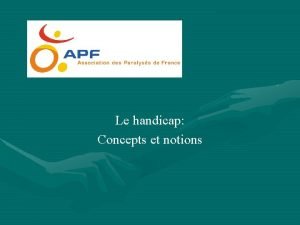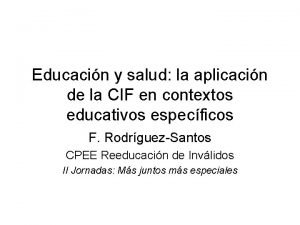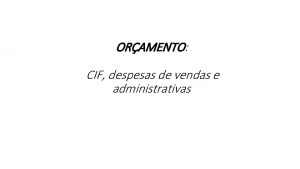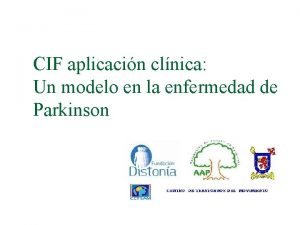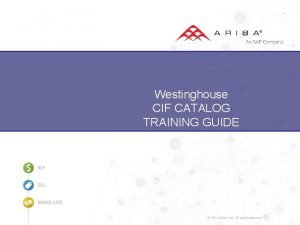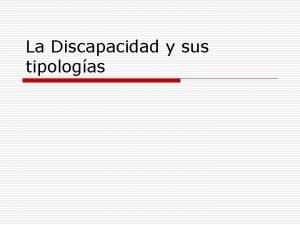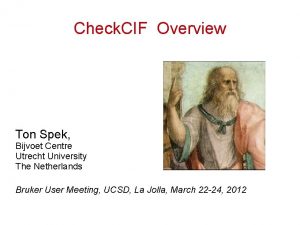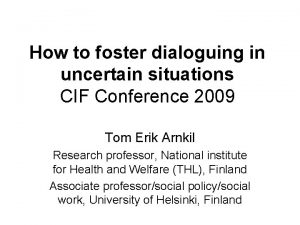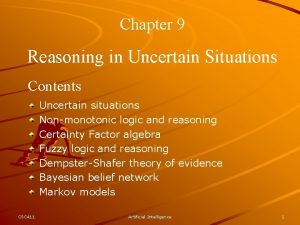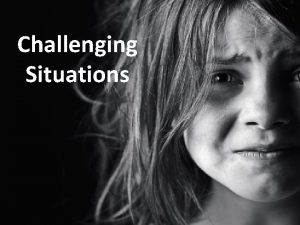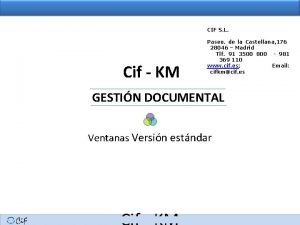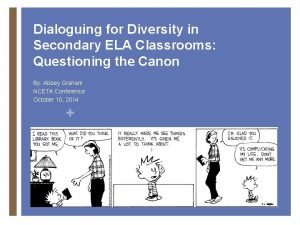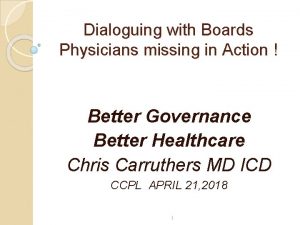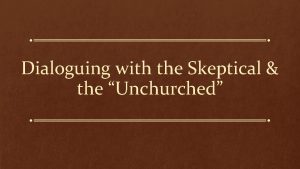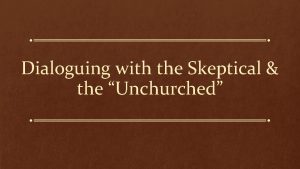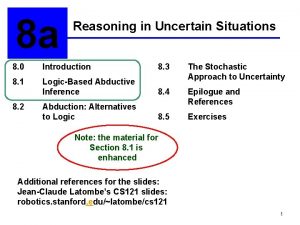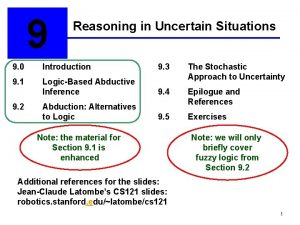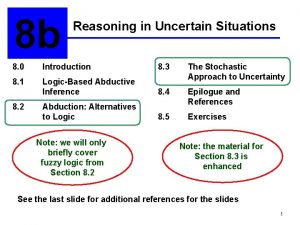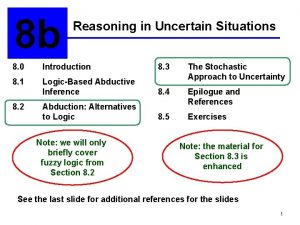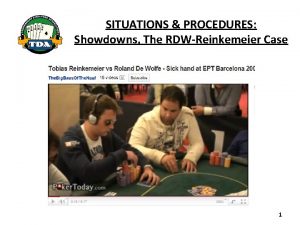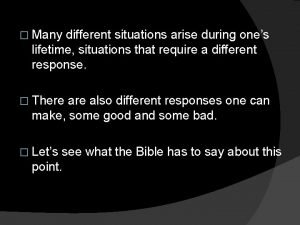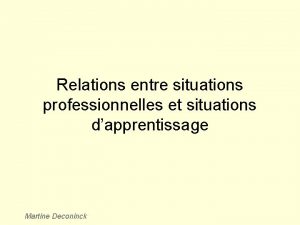How to foster dialoguing in uncertain situations CIF




















- Slides: 20

How to foster dialoguing in uncertain situations CIF Conference 2009 Tom Erik Arnkil Research professor, National institute for Health and Welfare (THL), Finland Associate professor/social policy/social work, University of Helsinki, Finland

Our team at THL: Methods and practices for co-operation • Method development and action research in successive projects for two decades • In close collaboration with municipalities: players at all levels • Central idea: dialogues for combining strengths and resources; from expert-centred work to open cooperation • At present: intensive developmental work and research with two municipalities (Nurmijärvi and Rovaniemi 2003 -2009): all the professionals & superiors & administration working with children, adolescents and families (from maternity clinics to schools, from kindergartens to social work…) • Manuals, guidelines and training programs (nationwide; 2009: Oslo/Norway)

Context: “Full blown” (or “late”) modernization Diversified professional system (Luhmann: Modernization=society diversifies into systems and sub-sub-systems that operate on specialized codes) Individualization (Beck: Modernization=profound transformation of society <->individual relationships)

In Finland ü Emphasis on public services (less on commercial & third sector) ü Emphasis on professional help (less on personal networks) ü High degree of specialization ü High value on individuation/independence: turn 18 and you’re out in the world. . . = Multi-agency networks around individuals

Multi-agency situations In stead of "multi-problem families/clients" one should talk about multi-agency families/clients because ü extensive problems lead to client-relationships with various agencies simultaneously ü multi-agency situations are complex; further specialization increases complexity ü new integration is necessary ü talk about "multi-problem families/clients" is stigmatising (Imber-Black 1988)

The dilemma: It is necessary to cross boundaries horizontally and vertically ü across sectors, agencies and professions ü towards clients and their personal networks ü across hierarchical levels of management ü between public, private and 3 rd sector players Bureaucracies are sectored, everyday life is not Sektori B Sektori A Ysikkö A 1 Yksikkö A 2 B Yksikkö A 3 Yksikkö B 1 Yksikkö B 2 Yksikkö B 3

Dialogue: The art of crossing boundaries Reaching out accross boundaries calls for responsiveness - instead of dictating how others should think & act Dialogue is thinking together • Monologue: finite utterances. • Dialogue: words do not have fixed meanings. A joint language area is formed in dialogues, new meanings are generated

Uncertain situations Giddens, Beck & Lash (1994): Reflexive modernity • Actions have intended and unintended consequences - and the present is a mix of both • Everything ”echoes back” (think of global warming/green house effect, for example) • The certainty & credibility of expert systems (c. f. the 50’-60’ ”social engineering”) evapourates • Complexity: less control (and fantasies of control) <-> need for tolerating uncertainty

Have you ever been in a "grey zone of worry"? If you ü know or have a hunch that there are others somehow connected with the situation you are working with ü anticipate that things are not going in the right direction ü would welcome more resources of help ü feel that you are somehow in the dark of what is going on ü feel that what others do affects what you can achieve ü would welcome more control of the whole you are in a grey zone of worry

Zones of subjective worry (Arnkil & Eriksson) NO WORRY SMALL WORRY GREY ZONE GREAT WORRY Feelings of slight worry or wonder; confidence in one's own possibilities to support -> Thoughts of a need for additional resources Worry growing; confidence in own possibilities diminishing or running dry. -> Clearly felt need for extra supporters and controllers. Constant strong worry: child/client/ patient in danger. Own means exhausted. ->Change and safety needed immediately.

Appeal: Do not classify clients! The zone-instrument was made for ü "sensitising" professionals and encouraging them to take action ü encouraging appreciative communication between perspectives ü reflecting upon good practices (for lessening worries) ü working out guidelines for action The zone-instrument is not for classifying/labelling clients. It is the observer who finds her/himself "in" a zone. Worries change, labels stick.

Our methods for worry-zones NO WORRY SMALL WORRY GREY ZONE GREAT WORRY Dialogues for reflecting & exchanging local knowledge: what works, what are we doing right in each zone Early dialogues: Taking up worries in respectful ways Anticipation Dialogues/ Future Dialogues with families & personal networks Developed by others: Family Group Conferencing for child protection Open Dialogues for mental health work

Uncertainty and authoritative discourse • When one feels that the situation is slipping out of control and uncertainty rises, one is tempted to add control by trying to control how others should think and act. • Bakhtin 1981: Authoritative discourse demands obedience; internally persuasive discourse allows dialogic co-generating.

Dialogicity & tolerating uncertainty • Each person has a unique point of view (literally: point from which a view opens) • Polyphony, plurality of voices adds to possibilities to think differently, to generate and develop thoughts • Each individual lives in different "positions" and is therefore multi-voiced • At the interface of inner dialogues and external dialogues rich polyphony emerges.

Anticipation dialogues: recalling the future with families …interview Facilitators Family & friends Professionals …take public notes (on flap chart, etc. )

Facilitators' questions To the family group: 1. A year has passed and things are quite well. How are they for you? (What are you especially happy about? ) 2. What did you do to bring about this positive development - and who helped you and how? 3. What made you worried "a year ago" and what lessened your worries? To the professionals: 1. As you heard, things are quite well in the family. What did you do to support the good development - and who helped you and how? 2. What made you worried "a year ago" and what lessened your worries?

• Before closing, participants "return" from the future and discuss co-operation & make a plan • The next step(s) are crucial and need to be planned concretely: who does what with whom next • A follow-up meeting is agreed upon - if found necessary. (Follow up supports commitment of each party) • Immediate feed-back for research is gathered at the very end of the meeting • Evaluation/research data is gathered also in follow up-meetings

Dialogue is orienting to responses, responsiveness (Bakhtin 1981, 1986): • “For the word (and, consequently, for a human being) there is nothing more terrible than a lack of response”. • “Being heard as such is already a dialogic relation”.

At the heart of dialogism (at least) listening and being heard, enhanced by: ü space, reflective structures; dealying comments, separating talking and listening ü talking in the first person (vs. "representing the general view") ü responsiveness; taking the Other into account ü open sentences inviting responses (vs. finitite utterances) In dialogue, one attempts to nourish possibilities for developing joint understanding It is crucial to foster possibilities to go on

Further reading: Jaakko Seikkula & Tom Erik Arnkil: Dialogical Meetings in Social Networks. Karnac Books 2005. (Also available in German, Swedish, Danish, Norwegian and Finnish)
 Monterey trail high school football
Monterey trail high school football Data warehousing components
Data warehousing components Incoterms 2020 ppt
Incoterms 2020 ppt Modelo cif
Modelo cif Cif ss coaches wanted
Cif ss coaches wanted Cih cif
Cih cif Factores que conforman el modelo interactivo de la cif 2001
Factores que conforman el modelo interactivo de la cif 2001 Instituto nacional de la seguridad social (inss)
Instituto nacional de la seguridad social (inss) Karakteristik cif
Karakteristik cif Actividades y participacion cif
Actividades y participacion cif Orçamento cif
Orçamento cif Modelo de la cif
Modelo de la cif Cif catalog ariba
Cif catalog ariba Que es la cif
Que es la cif Quimpanor
Quimpanor Cpt paritet
Cpt paritet Cpf cif dif definition
Cpf cif dif definition Classification cif exemple
Classification cif exemple Check cif
Check cif Cif file
Cif file Formula costo primo
Formula costo primo





